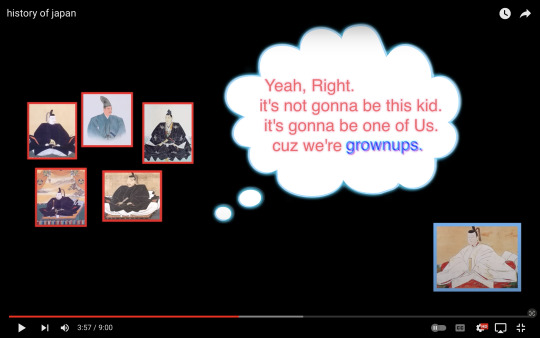#History of Japan
Explore tagged Tumblr posts
Text
youtube
#history of japan#poll#please reblog i did so good not gerrymandering the options#can u tell this video lives in my subconscious at all times#Youtube
101 notes
·
View notes
Text
Like most of the characters in Shōgun, John Blackthorne is actually based on a real person. William Adams was an English navigator who arrived in Japan in 1600 and quickly became a key adviser to Tokugawa Ieyasu, the future shōgun, who saw him as a valuable source about Western culture, weapons, and ship building, commissioning him to build the first western style ships in Japan. For his services to leyasu, Adams was given the title of Miura Anjin and eventually rose to the rank of samurai and hatamoto, with Hemi as his fief. He remained in Japan for the rest of his life. His memorial site was designated a National Historic Site by the Japanese government in 1923.
#shogun#william adams#john blackthorne#james clavell#history of japan#clavell basically just took the real historical events and put his own characters into so he could have a bit more creative freedom
122 notes
·
View notes
Text
did this pop into anyone's head immediately after starting shogun or was it just me

31 notes
·
View notes
Text
the new History of Japan episode is honestly kind of hilarious
You are the 17th century Tokugawa Shogunate. For various reasons, you need more cash. For castle upkeep and such, and also because the feasts and gifts involved in hosting all your vassal lords in the capital literally half the time add up real fast.
Due to the neo-Confucian ideology your entire state is based around, raising taxes on the peasentry outright would be a Bad Look.
Through some new censuses and offering incentives to peasants to work new fields and such, you significantly increase the yearly rice yields (and thus the share of taxes you get from them). Good job!
Taxes are paid in rice, as are the stipends you give all your samurai retainers.
The gifts and castle repair and such your need are bought with silver.
There is now much more rice. There is not any more silver.
Rice prices crash. City dwellers everywhere rejoice.
Ohshit.
108 notes
·
View notes
Text

Japan, How bout I do anyway?
54 notes
·
View notes
Text
Get some popcorn, because I'm about to tell another tale from Japanese history.

(I like this terrible story.)
In AD 984, Prince Morasada ascended the Chrysanthemum Throne and became Emperor Kazan. He was 17 years old.
His mother was one of the influential Fujiwara clan, and "influential" is an insufficient word. The Fujiwara were tightly involved in imperial politics, married into every level of the royal family and holding most key ministerial positions. (In my Kitsune Tales stories, when Kaede takes the name of the Fujitani, that is my small nod to the Fujiwara of history.) Even today, over a millennium later, at the revered Kasuga Taisha in Nara (that's the Shintō shrine with the famous bowing deer), there is a gate that only the Fujiwara may use.
Fujiwara no Kaneie, Kazan's great-uncle, definitely had his fingers in all the political pies. But neither of Kazan's two principal consorts were Kaneie's daughters (one was a niece), so if either bore Kazan a son, Kaneie would not be entitled to a regent's position. There were two possible solutions: get an heir from one of Kaneie's daughters, or remove Kazan before he fathered an heir and replace him with someone in Kaneie's own line.
The opportunity opened in 985, when Kazan's favorite consort died, still in her teens. Fujiwara no Shishi was Kaneie's niece, but it was Kazan who mourned her. Beset by pressures of the competing ministers, grieving, and still only a teenager, Kazan likely fell into depression.
But Kazan's friend and cousin Michikane was there to support him. Michikane was only a few years older, and he knew well the pressures of the imperial court, being a Fifth Rank official himself. He empathized with Kazan and supported him in his increased religious studies, as Kazan sought solace in Buddhist teachings. When Kazan wondered aloud about leaving behind the world to follow a religious life, Michikane did not laugh, but encouraged him to think about it. When Kazan said he would like to become a monk, Michikane applauded his dedication. "And as the bonds between us are so strong," it is reported he said, "I will immediately join you, as a subject should serve his sovereign," and they would become monks together.
Plans were made, while Kaneie continued to apply political pressure. A message quietly passed to his two eldest sons prompted the three to take the imperial regalia -- the gods-gifts granting the divine right to rule -- out of the imperial palace and to Ichijō, son of a previous emperor. He was only 7; he would need a regent, and he was the son of Kaneie's daughter.
And finally, one summer midnight in 986, Kazan ordered his carriage out of the Sewing Hall Guard Gate. Some report that, as they rode out, Kazan hesitated. "Isn't this a bit hasty? Should we think it over?" But Michikane assured him he was doing the right thing, and further broke the news Kaneie had already sent the imperial regalia to his successor. Kazan conceded that there was no point to returning, and they went on to the temple Gangyō-ji.
Kazan shaved his head to take religious vows, but when he met his friend Michikane again, Michikane still had his hair. "I want to see my parents once more," Michikane explained through tears. (Culturally, he had a filial obligation to his parents, per Confucian teaching, and once he became a monk he would sever that connection. Wanting to see them once more was understandable.) "My parents won't prevent me from returning, though, and I'll come back soon to join you."
But Kazan, with slow realization, did not believe this last promise. He stared at Michikane. "You have deceived me."
"Why would I do such a thing?" Michikane protested. "I'll be back soon!" and then he left.
But the penny had dropped; Kazan now realized why Michikane would do such a thing. Michikane left the temple and joined the armed escort waiting for him, and they together rode home to his father, Fujiwara no Kaneie, regent to the new emperor.

(And now, the commercial)
The Only The Dead Face North Kickstarter!
In Only The Dead Face North, a rumor that a missing imperial treasure was taken by Kazan as he abdicated by night and hidden along a religious pilgrimage route sends humans and yōkai racing to find it, not only for its monetary value but for political leverage in the young shōgunate.
You can back the new story here, getting your own copy for as little as $5, or get the previous stories in the series in this exclusive boxed set, available only direct and, in honor of the Kickstarter, currently discounted with 25% off with code BETRAY (through Feb 22, 2024).

(And feel free to let me know if you enjoyed this bit of history!)
Find Me!
I'll be talking about history and my historical fantasy with Lost Without Japan, a podcast about visiting Japan and related cool topics. Watch for that episode the week of February 12, 2024.
And I'll join the fabulous World Anvil team on February 16 to discuss Kickstarter and projects. Watch us live at 1pm Eastern (find your local time here) or catch the replay.
#japanese history#history#writeblr#am writing#writing community#historical fiction#historical fantasy#history of japan#fantasy#wip#books#am writing fantasy#writers#writing#heian period#heian era#kazan#emperor kazan#fujiwara#shogunate#kamakura
22 notes
·
View notes
Text
In Japan and apparently Hirohito has been rebranded posthumously renamed Showa.

2 notes
·
View notes
Text

From ‘Zen and Japanese Buddhism’ by Daisetsu T. Suzuki
Quoted in ‘History of Japan’ by Ienaga Saburo
#just finished#reading#books#zen#zen buddhism#ienaga saburo#daisetsu t suzuki#history of japan#japan#books about japan
2 notes
·
View notes
Text
78. History is full of horrors: Japan's Comfort Women, by Yuki Tanaka
Subscribe to continue reading Subscribe to get access to the rest of this post and other subscriber-only content. Type your email… Subscribe Already a subscriber?

View On WordPress
1 note
·
View note
Text
my description: don't follow me or touch my posts if you're a bot.
bots:

3 notes
·
View notes
Text
There was a trivia question last night about Japan and the History of Japan video surfaced in my brain from the depths of oblivion and provided me with the answer. So that's something.
#knowledge from 8 years ago comes in handy#it arrived fully formed#heard the question - the video appeared in my mind and I had the answer#history of japan
3 notes
·
View notes
Text

"open... the window. stop... having it be closed."
2 notes
·
View notes
Text
Nobunaga owned piles upon piles of European clothes...
It still doesn’t necessarily mean that he wore them, though.
I’m posting this as something of a correction and update on my previous post saying that there is no solid proof yet that Nobunaga doesn’t wear European clothes.
My point still stands in the sense that nobody so far has produced the proper documentation of him wearing them. Maybe somewhere in the European accounts or diaries that are harder to find, the account actually exist, but I just haven’t been able to see it.
What I wanted to correct was my claim that “he only received one cloak from Frois”. I was wrong, and I have fixed the original post. I just thought I’d post a longer detailed post too, rather than bloating the old post with more text.
In the Historia de Japam, Frois wrote that in 1569, the Kyoto upper class heard that Nobunaga had interest in European articles and presented him with:

“clothing from Europe, carmine cloaks, caps and velvet hats with feathers, gold medals with the image of Our Lady (Virgin Mary), pieces of cordovan, timepieces, luxurious kidskins, brilliant crystalline Venetian glass, damasks, satins, and various other articles from India, with which they filled many large crates”
(From Historia de Japam vol 2, published by Biblioteca Nacional de Lisboa)
I’m inclined to believe that he kept the clothes, since it would have been rude to refuse them. Nobunaga would have needed to maintain a good relationship with the upper crust of Kyoto, this early in his career.
I’d love to be able to clarify if the timepieces were watches (which did exist in the 16th century), or if they were clocks. There was another Frois account that said he presented Nobunaga with an alarm clock, but Nobunaga rejected it on the grounds of “it would be difficult to regulate” (per the English translation in “They Came to Japan” book). I’m assuming it just didn’t make sense for Japanese people, because their way of counting the hours is completely different. The Japanese translation, though, interpreted this as meaning that “they won’t be able to fix it if it broke”.
*) Correction: I previously wrote that “capas de grã” was imperfectly translated into “red cloaks” in Japanese, but someone sent a correction and said that the translation was right. The word “grã” does mean red dye, so I removed the note.
#oda nobunaga#luis frois#historia de japam#history of japan#European artifact#clothing#japanese history#nanban trade#jesuit#Jesuit missionary#society of jesus#samurai#nobunaga oda
10 notes
·
View notes
Text
The mcytblr sexymen poll right now:
14 notes
·
View notes
Text
youtube
#jrpg games#jrpg#gaming#video games#politics#japan#final fantasy vii#final fantasy vi#capitalism#false gods#god#religion#stagnation#chrono trigger#earthbound#history of japan#empire of the sun#empire of japan#god of war#norse mythology#greek mythology#journey to the west#china#romance of the three kingdoms#conservative#the economy#midgard#persona 5#gaming reviews#gaming related
2 notes
·
View notes